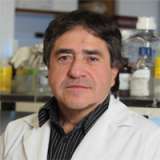Fernando Gomez-Pinilla, PhD

Fernando Gomez-Pinilla, PhD
Professor and Director of the Neurotrophic Research Laboratory with secondary appointment in Physiological Science
Hospital Affiliation
David Geffen School of Medicine at UCLA
Department of Neurosurgery
PO Box 956901
Los Angeles, CA 90095-6901
Contact: (310) 206-9693
Education
- Postdoc, Neural Regeneration at University of California at Irvine (1986)
- Ph.D., Anatomy & Cell Biology at University of California at Los Angeles , (1986)
- M.S., Neurobiology at the University of Chile (1979)
- B.A., University of Chile (1977)
Research Area
Dr. Fernando Gomez-Pinilla is Professor of Physiological Science. His research goal is to investigate the molecular mechanisms of neuronal adaptation to insult, disease, and environmental factors by focusing on the action of neurotrophic factors as major effectors of neuronal growth and survival, synaptic function, ultimately resulting in behavioral manifestations. His laboratory uses a multidisciplinary approach ranging from gene expression to behavioral techniques, and involving the brain and spinal cord of animals and humans. His work is widely published, including elite publications such as 'Nature' magazine.
Grants
- 1RO1- NS45804(F. Gomez-Pinilla, PI) 04/01/2005-01/31/2009
Activity- induced recovery after brain trauma
The goal of the project is to determine the mechanisms of action of exercise helping recovery events after brain trauma. - NIH 1R01NS 50465-01A1 (F. Gomez-Pinilla, PI) 08/15/2005-08/14/2010
Restoration of homeostasis after brain trauma
The goal of this application is to evaluate the role of oxidative stress and energy balance on the brain response to traumatic brain injury and the capacity of activity to restore the loss of homeostasis.
Links
Publications (recent articles)
- Gomez-Pinilla F, Vaynman S, Ying Z. Brain-derived neurotrophic factor functions as a metabotrophin to mediate the effects of exercise on cognition. Eur J Neurosci. 2008 Dec;28(11):2278-87.
- Hu S, Ying Z, Gomez-Pinilla F, Frautschy SA. Exercise can increase small heat shock proteins (sHSP) and pre- and post-synaptic proteins in the hippocampus. Brain Res. 2009 Jan 16;1249:191-201.
- Griesbach GS, Sutton RL, Hovda DA, Ying Z, Gomez-Pinilla F. Controlled contusion injury alters molecular systems associated with cognitive performance. J Neurosci Res. 2008 Oct 1.
- Gomez-Pinilla F, Kostenkova K. The influence of diet and physical activity on brain repair and neurosurgical outcome. Surg Neurol. 2008 Oct;70(4):333-5; discussion 335-6.
- Haastert K, Ying Z, Grothe C, Gómez-Pinilla F. The effects of FGF-2 gene therapy combined with voluntary exercise on axonal regeneration across peripheral nerve gaps. Neurosci Lett. 2008 Oct 10;443(3):179-83.
- Ying Z, Roy RR, Zhong H, Zdunowski S, Edgerton VR, Gomez-Pinilla F. BDNF-exercise interactions in the recovery of symmetrical stepping after a cervical hemisection in rats.Neuroscience. 2008 Sep 9;155(4):1070-8..
- Wu A, Ying Z, Gomez-Pinilla F. Docosahexaenoic acid dietary supplementation enhances the effects of exercise on synaptic plasticity and cognition. Neuroscience. 2008 Aug 26;155(3):751-9.
- Gómez-Pinilla F. Brain foods: the effects of nutrients on brain function. Nat Rev Neurosci. 2008 Jul;9(7):568-78. Review.
- Griesbach GS, Hovda DA, Gomez-Pinilla F, Sutton RL. Voluntary exercise or amphetamine treatment, but not the combination, increases hippocampal brain-derived neurotrophic factor and synapsin I following cortical contusion injury in rats. Neuroscience. 2008 Jun 23;154(2):530-40.
- Chytrova G, Ying Z, Gomez-Pinilla F. Exercise normalizes levels of MAG and Nogo-A growth inhibitors after brain trauma. Eur J Neurosci. 2008 Jan;27(1):1-11.